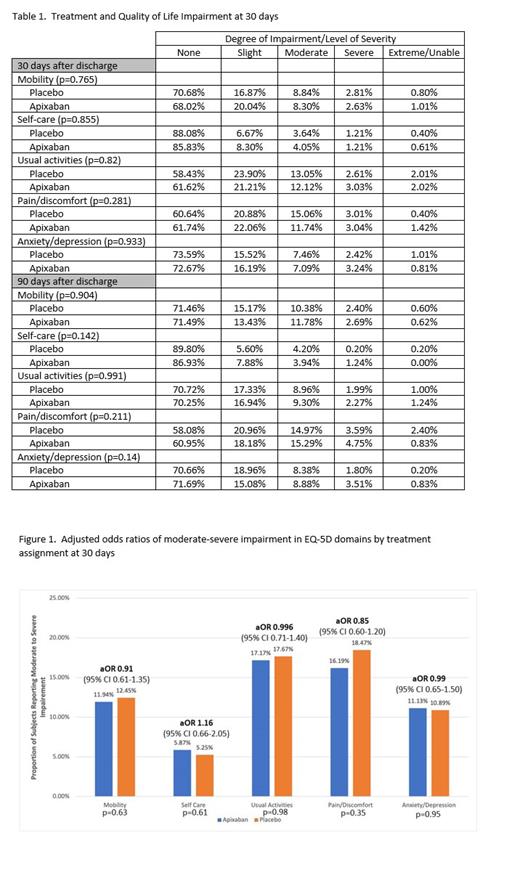Introduction. Post-acute sequelae of SARS-CoV2 infection, or PASC, is defined as the presence of persistent symptoms for at least two months after an acute infection with COVID-19. A potential pathophysiologic mechanism for PASC is microvascular thrombosis. Using EQ-5D-5L index scores, we previously reported that extended thromboprophylaxis for 30 days with apixaban did not impact quality of life (QoL) at 30 or 90 days after discharge (Wang et al, Ann Intern Med 2023; 176:515-523). The purpose of this investigation was to determine whether anticoagulation had a variable impact on the individual domains measured by EQ-5D-5L.
Methods. ACTIV 4c was a prospective, randomized, placebo-controlled, double-blind clinical trial comparing post-discharge thromboprophylaxis with apixaban 2.5 mg twice daily to placebo for 30 days in patients hospitalized with COVID-19. Participants were enrolled at 107 hospitals in the US between February 2021 and June 2022. We ascertained symptoms and QoL by EQ-5D-5L at 2 days, 30 days, and 90 days after hospital discharge by electronic or telephone follow-up. The five domains of EQ-5D-5L are: mobility, self-care, usual activities, pain/discomfort, and anxiety/depression. Each domain has 5 levels of response, ranging from “no problems/none” to “unable to perform/extreme”, which are used to determine individual scores. We analyzed the impact of treatment (placebo vs. apixaban), antiplatelet therapy (yes vs. no), and highest WHO severity score during hospitalization (score <5 vs. score ≥5) on degree of impairment at 2, 30, and 90 days post-discharge using a chi-square test for those participants who completed the survey at each timepoint. We also used a proportional odds model to test for at least moderate impairment in each EQ-5D-5L domain, also at 30 and 90 days, using odds ratios adjusted for age (restricted cubic spline with 3 knots), sex, D-dimer (normal or abnormal), BMI (restricted cubic spline with 3 knots), antiplatelet usage (yes/no - at enrollment), WHO severity score (<=5 vs. > 5), and the randomized treatment.
Results. We randomized 1217 participants hospitalized with acute COVID-19 onto ACTIV 4c, with 610 participants assigned to apixaban and 607 participants to placebo. A total of 208 participants taking apixaban (43.5%) and 219 participants taking placebo (45.0%) reported moderate or greater impairment in one or more of the EQ-5D-5L domains by 2 days after hospital discharge. The individual domain most frequently reported as impaired was usual activities (33.0% of all study participants). By 30 days after discharge, 151 participants taking apixaban (30.8%) and 165 taking placebo (33.4%) reported moderate or greater impairment in one or more domains. The individual domain with the largest improvement was usual activities, affecting 17.4% of all study participants. By 90 days, 152 participants taking apixaban (31.5%) and 142 participants taking placebo (28.5%) reported moderate or greater impairment in one or more domains. Extended thromboprophylaxis with apixaban was not associated with improved scores for any of the individual EQ-5D-5L domains at 30 days or 90 days (Table 1). Stratification by WHO severity score during hospitalization revealed a significant improvement in the domain for usual activities for participants with score <5 compared to those with a score ≥5 (p=0.015) by 30 days, but this difference was not present by 90 days. Stratification by anti-platelet use did not identify any domains with improvement associated with antiplatelet therapy at 30 or 90 days. Using adjusted odds ratios, we did not find a benefit for apixaban at 30 days (Figure 1) or at 90 days (data not shown).
Conclusion. Almost half of patients hospitalized with COVID-19 have decreased QoL at time of discharge, with the greatest impact on performance of usual activities. Impaired QoL persists for up to 90 days after hospital discharge in one-third of patients. Extended thromboprophylaxis with apixaban for 30 days at the time of hospital discharge in participants with acute COVID-19 was not associated with improvements in QoL as assessed by EQ-5D-5L.
OffLabel Disclosure:
Kasthuri:StrideBio: Current equity holder in publicly-traded company. Krishnan:Regeneron: Research Funding; AstraZeneca: Consultancy; GlaxoSmithKline: Consultancy; BData, Inc: Consultancy. Patel:Incyte: Research Funding; Parexel International Limited: Research Funding; Novartis: Research Funding; Partner Therapeutics: Research Funding; Fulcrum Therapeutics: Research Funding; United Therapeutics Corporation: Research Funding; GlaxoSmithKline: Research Funding; Insmed Incorporated: Research Funding; Merck Sharp & Dohme LLC: Research Funding. Weissman:Inflammatrix, Inc: Consultancy. Quigley:Servier Pharmaceuticals: Speakers Bureau; Pfizer: Research Funding; Rigel Pharmaceuticals Inc.: Current equity holder in publicly-traded company, Honoraria; Alnylam Pharmaceuticals: Speakers Bureau; Amgen Pharmaceuticals: Research Funding; Teva Pharmaceuticals: Research Funding; Recordati Rare Diseases, Inc: Honoraria; Mitsubishi: Consultancy; AbbVie: Research Funding. Siegal:Astra Zeneca: Honoraria, Other: paid indirectly to my institution; BMS-Pfizer: Honoraria, Other: paid indirectly to my institution; Roche: Honoraria, Other: paid indirectly to my institution; Servier: Honoraria, Other: paid indirectly to my institution. Wang:Astra Zeneca: Honoraria, Other: Currently no relationship, Research Funding; Bristol Myers Squibb: Consultancy, Other: Currently no relationship, Research Funding; Artivion: Consultancy, Honoraria, Other: Currently no relationship, Research Funding; Chiesi: Other: Currently no relationship, Research Funding; Boston Scientific: Other: Currently no relationship, Research Funding; Abbott: Other: Currently no relationship, Research Funding; Novartis: Consultancy, Honoraria, Other: Currently no relationship; CSL Behring: Consultancy, Honoraria, Other: Currently no relationship; Pfizer: Other: Currently no relationship, Research Funding. Ortel:Takeda: Research Funding; UpToDate: Honoraria; Siemens: Research Funding; Stago: Research Funding; Sanofi: Consultancy; CDC: Research Funding; NIH: Research Funding; Instrumentation Laboratory: Consultancy, Research Funding.
Apixaban for extended thromboprophylaxis following hospitalization with acute COVID-19


This feature is available to Subscribers Only
Sign In or Create an Account Close Modal